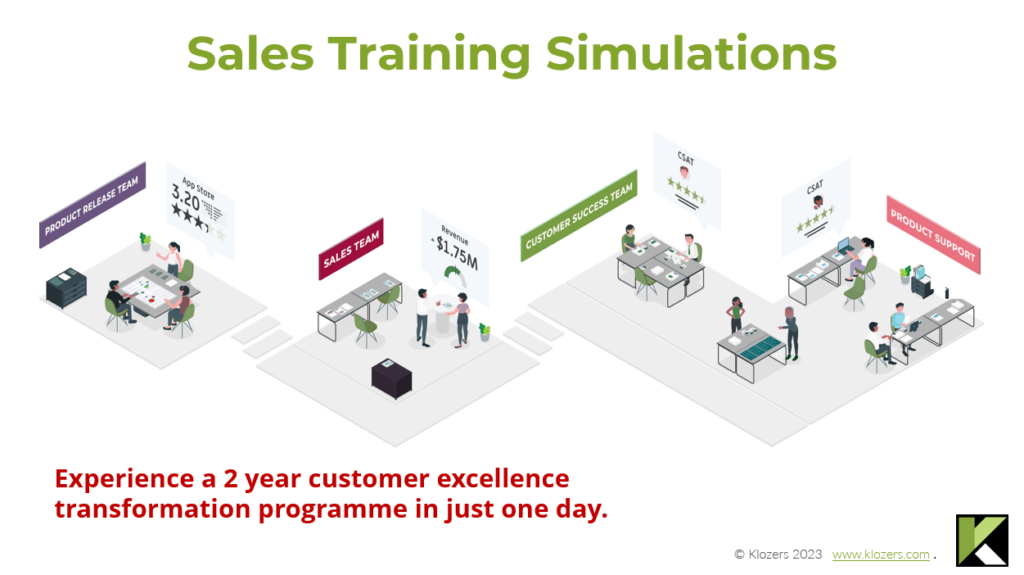There’s a new way to deliver sales growth…
Don’t buy Sales Training until you’ve watched this video…

Here’s the short answer:
A sales simulation uses real life sales and customer service scenarios to provide companies with real insights into their sales systems and processes. In addition they provide employees with the skills and knowledge they need to excel in their roles and deliver exceptional service to customers.
Don’t buy Sales Training until you’ve watched this video…
Klozers Sales Training Simulation is designed to help businesses revolutionise the customer experience. Using proven business game techniques and expert facilitation, our simulation guides participants to discover and apply best-practice methods that have real-world application.
The simulation is a powerful catalyst for winning the hearts and minds across an organisation driving toward:
We currently offer three simulation games/scenarios based on:
The idea of sales and marketing being different units within a business has ended. Modern dynamic businesses no longer follow the traditional sales and marketing model. They align teams around growth and our simulation demonstrates in real time scenarios how to fast track your sales and marketing processes.
The simulations build on any previous sales training your sales team may have had and help sales managers demonstrate how every day sales decisions, sales processes, and front line sales reps, impact the entire customer experience.
These new skills help sales professionals navigate complex sales deals and and serve as the foundation of any effective sales development strategy
c) Customer Service Transformation
Churn and low CSAT scores kills every growth at best, and will kill your business at worst. Our training simulation takes your team through the systems and processes to drive improvements in customer service and sales.
By providing real life scenarios in a risk free environment we help teams build their confidence, develop their critical thinking skills and ultimately deliver sales success.
We use state of the art business dashboards which are accelerated to allow the players to see the results in real time from the decisions and actions they take during the game.
The overall context of each game is always to make the organisation more successful. In addition we include dashboards for each “department” so they gain a better understanding of the issues and challenges within those roles.
Each game consists of three rounds which give all the sales team members the chance to learn and them implement the changes they believe will help to drive the organisation forward. Live leader boards show where the organisation is with respect to their competitors to ensure the game is realistic.

Whilst playing a training simulation is great fun and helps improve the culture and team building within the business it’s important to that each game delivers a business impact.
To that end, we have developed our own training process and use a series of assessments prior to training which allows us to uncover the unique challenges and business problems within each department. Our facilitators then focus the players on these issues during the game and start the conversation around what and how needs to be improved.
We also work in advance with your learning and development teams to identify the learning objectives that they are looking to achieve using the simulation.
The penultimate step in the process is to generate improvement plans and roadmaps to ensure all the learning points are captured and subsequently actioned.
Lastly, our trainers are on hand to deliver the soft skills and any sales training that your customer service and sales teams need to take them to the next level.
Does your business need support with:
Indicating a lack of satisfaction and loyalty, which can harm the reputation and profitability of the business.
Without an understanding of strategic business selling some customers can drain resources and impede business growth.
Low satisfaction can lead to decreased customer loyalty and negative word-of-mouth, harming a business’s reputation and revenue.
Missing service targets can lead to dissatisfied customers, low trust, missed opportunities, and decreased revenue.
A lack of effective communication and collaboration can create inefficiencies, reduce productivity, and hinder innovation.
This can prevent a business’ growth over the long term, limiting its ability to adapt to changing market conditions and meet current and future customer demand,
These can lead to decreased productivity, increased costs, and reduced profitability, ultimately hindering the organization’s ability to compete and succeed in the marketplace.
Leading to increased call volume, additional customer support costs, and increased customer dissatisfaction, as well as negatively impacting customer loyalty and retention.
Whilst training simulations undoubtedly win the hearts and minds of the audience, traditional sales team training still plays an important part after the games.
Klozers provenance in sales training means that you can be sure, that in addition to the simulation training our team will work with you to develop an effective sales strategy, streamline your sales process, reduce your sales cycle and develop the sales skills of your sales managers and sales reps.
We have a range of sales, marketing and customer service training courses that we can then use depending on the assessments, game outcomes and roadmaps.
This holistic solution delivers the impact on teams that organisations need to drive real change.

What sets our games apart from traditional training solutions are they are both fun and engaging in nature.
Employees love playing the games and immediately go from passive, to interacting with both the game and their colleagues.
In addition to the specific learning objectives that we would work with you to identify in advance, every game improves team building, team culture and performance. In addition to wining the hearts and minds of participants.
Organisations leave our training simulations with clear roadmaps with actions to make ongoing improvements to their business.
Our games are facilitated by experienced team leaders who customise each game to the needs of your business and your people.
“A fantastic learning experience”
Amanda – Account Manager

Iain Swanston has spent over 30 years in B2B sales selling, training and leading teams both domestically and internationally. In addition he serves as an Associate at Strathclyde University Business School where he has delivered the sales content for the Masters in Entrepreneurship since 2015.
107a High Street
Dalkeith
EH22 1AX
United Kingdom
Schothorsterlaan 11,
3822 NA,
Amersfoort,
Netherlands
Tel: +31 33 7544777
8911 North Capital of Texas Highway, Suite 4200 #1154
Austin, TX 78759
United States
Klozers
Ground Floor
470 St Kilda Road
Melbourne VIC
3004